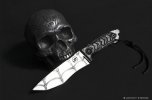- Joined
- Aug 12, 2006
- Messages
- 1,302
A friend of mine just asked me to check out Johnny Strong Knives and it turns out my friend was right, I do like them.  He molds his handle scales and while it limits the handle shape there are some interesting things that can be done. Is this something that can be tackled by the home user without too much expended in start up costs? I looked into Delrin, Noryl GTX and Valox but I can't really say how friendly they are to work with or if they are even available to individuals (I know Delrin is). Anything better to work with? Should I forget the whole thing? Is it as simple as pouring a liquid into your mold (like making cupcakes) and letting it set?
He molds his handle scales and while it limits the handle shape there are some interesting things that can be done. Is this something that can be tackled by the home user without too much expended in start up costs? I looked into Delrin, Noryl GTX and Valox but I can't really say how friendly they are to work with or if they are even available to individuals (I know Delrin is). Anything better to work with? Should I forget the whole thing? Is it as simple as pouring a liquid into your mold (like making cupcakes) and letting it set?
Thanks!
 He molds his handle scales and while it limits the handle shape there are some interesting things that can be done. Is this something that can be tackled by the home user without too much expended in start up costs? I looked into Delrin, Noryl GTX and Valox but I can't really say how friendly they are to work with or if they are even available to individuals (I know Delrin is). Anything better to work with? Should I forget the whole thing? Is it as simple as pouring a liquid into your mold (like making cupcakes) and letting it set?
He molds his handle scales and while it limits the handle shape there are some interesting things that can be done. Is this something that can be tackled by the home user without too much expended in start up costs? I looked into Delrin, Noryl GTX and Valox but I can't really say how friendly they are to work with or if they are even available to individuals (I know Delrin is). Anything better to work with? Should I forget the whole thing? Is it as simple as pouring a liquid into your mold (like making cupcakes) and letting it set? Thanks!
